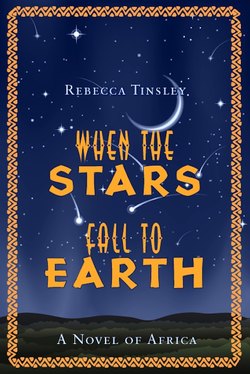Читать книгу When The Stars Fall To Earth - Rebecca BSL Tinsley - Страница 4
На сайте Литреса книга снята с продажи.
PREFACE
ОглавлениеIf you want a weighty academic book about what’s happening in Darfur, then please look elsewhere. This is not an account of politicians making historic decisions, or the exploits of daring war reporters in battle zones. The story just happens to be set in Sudan, in the heart of Africa and in a war zone.
Instead, this is a novel about people who find themselves in the middle of a horrific conflict and how they survive. Their choices affect their families, the people they love, and the course of their lives. Their stories start before the events in Sudan touch them, following them through challenges and triumphs, as they rebuild their lives. What they have in common with the rest of us is that their journeys are about finding out what kind of people they are: Should they try to draw strength from their anger or should they let it go? Is it better to stick with what you know or find the courage to change?
I do have an ulterior motive, however. I hope that by the time you finish the story you care about Sudan. When I first visited Darfur in 2004, the survivors I met urged me to take their stories to the outside world, to be their voice. I was astonished by their request because I make such an imperfect voice: I’m from North America, and my life has been easy. “But you’re here and you’ve listened to our stories,” my new friends pointed out.
I have done my share of interviewing African war-lords, monitoring elections in jungles, attending human rights trials, and working with survivors of genocide and civil war, from Bosnia and Turkey to Rwanda, Liberia, Mozambique, and Uganda.
But I’m also aware that most of us run a mile from depressing documentaries about Africa. So this novel is a work of imagination about people who are fundamentally like us, not a catalogue of horrors about dusty refugee camps. This story is about how we survive challenges while keeping a sense of ourselves, with our humanity intact. It is also about how we rebuild our lives with dignity so we can call ourselves survivors rather than victims.
Sudan affects us all because this remote region of Africa is the front line in a struggle for one of the most fundamental human values: tolerance, or “live and let live.” The military dictatorship that runs Sudan from the capital, Khartoum, is ruthlessly imposing its joyless, medieval version of Islam on Darfur. The regime’s philosophy, “Islamism,” is what guides Osama Bin Laden and the Taliban. Islamism demands that everyone obeys its extreme and intolerant version of Islam, imposed by force if necessary.
The people of Darfur practice a peaceful version of Islam. They want free speech and elections, and they yearn for modern schools and hospitals. And because Darfuris resist Islamism, they are being ethnically cleansed by the Khartoum regime, forced off their land and killed. There is a global civil war within the Muslim faith. We must not turn our backs on what is happening in Sudan because a victory for Islamism in Africa diminishes human civilization everywhere.
If, after reading the novel, you are interested in helping the people of Sudan, you will find a section at the back of the book outlining a number of clear and concrete steps you can take to make a real difference. Sudan is not an insoluble problem: There are things we can do to stop the violence without sending our own soldiers there. It just needs enough of us to care.
—Rebecca Tinsley, January 2011
